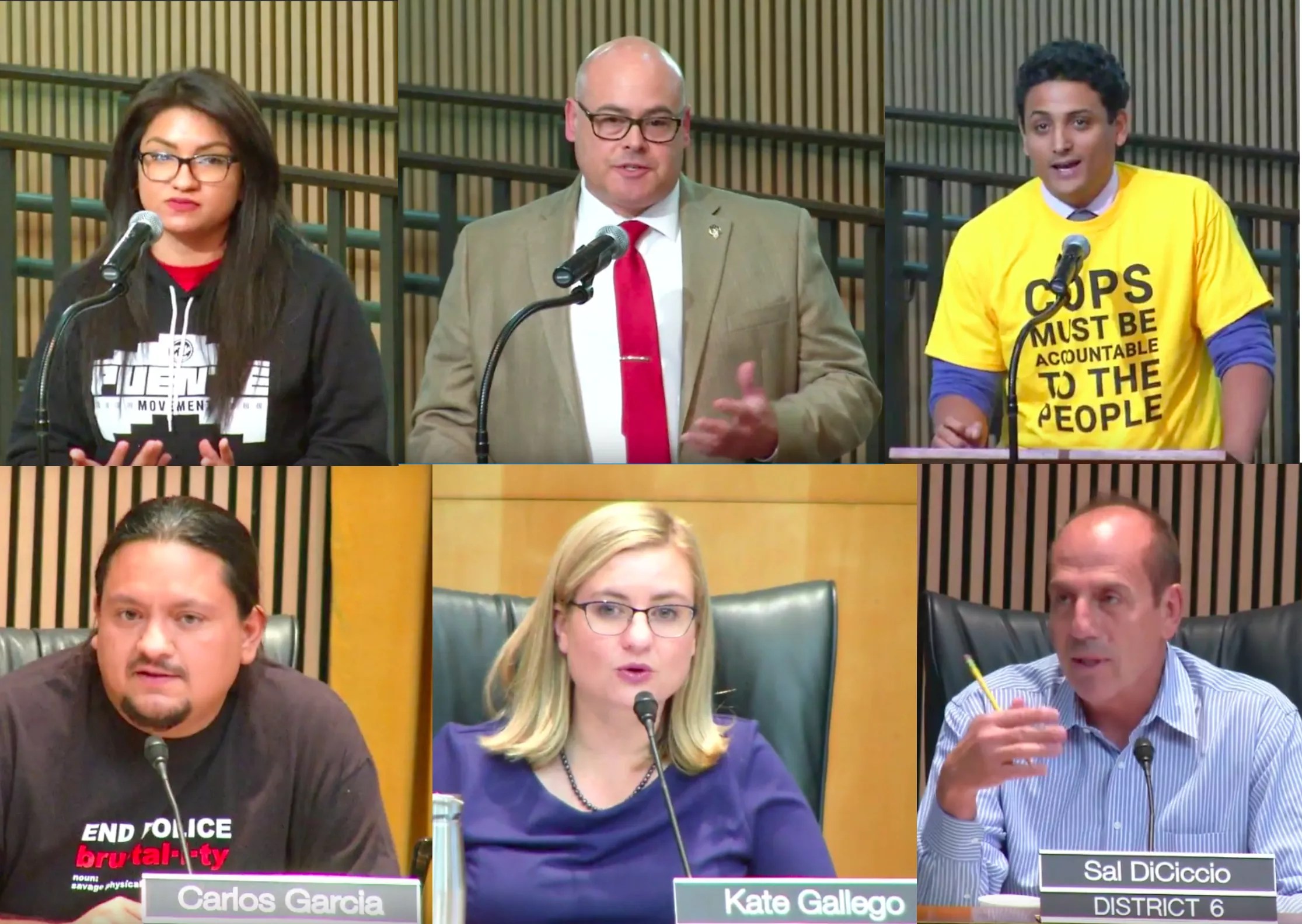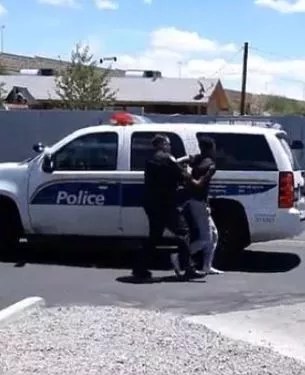
Phoenix City Council TV

Audio By Carbonatix
Two things were clear from this week’s Phoenix City Council meeting: Many people want to see independent oversight of the city’s police department, and even those opposed to the idea seem resigned to the fact that it’s probably going to happen next year.
Calls for civilian oversight of the Phoenix Police Department have been years in the making, but reached a tipping point this June when back-to-back high-profile incidents brought national scrutiny to Phoenix police. The viral video of a Phoenix cop threatening to shoot an unarmed black man in the head in front of his children and news that dozens of Phoenix police officers had shared racist, Islamophobic content on Facebook came on the heels of a record-high number of police shootings.
So when community members pressured City Council members not to pass this year’s $721 million budget for the police department without adopting a civilian review board one week after the viral video’s release, Mayor Kate Gallego agreed to call a special meeting on police reform. In the months since that video put Phoenix in the national spotlight, Police Chief Jeri Williams fired the officer involved and another officer who shared anti-Muslim memes, the mayor has put together a committee to enact long-stalled police reforms, and the city has hastened attempts to equip all officers with body-worn cameras by the end of this year.
But Phoenix remains the largest city in the country without independent oversight of police.
After the November 19 City Council meeting, however, that situation seemed sure to change.
Tuesday’s meeting was the Council’s third work-study session on civilian review boards since September, but it was the first that allowed public comment. The Council chambers at 200 West Jefferson Street were packed with people wearing yellow T-shirts with black lettering that read, “Cops must be accountable to the people” on the front, and “independent, investigative, transparent, and community driven,” on the back, which is a reference to the desired features of a civilian review board.
About 150 people attended the meeting, and dozens addressed the Council to explain their reasons for supporting (or not supporting) civilian oversight of police. An overwhelming majority of those who attended the Council meeting on Tuesday spoke in favor of implementing a civilian review board. Just three of the 40-to-50 speakers and five of the 42 people who submitted comment cards said they were against civilian oversight.
“We’re not asking for something radical – we’re just asking to catch up to the rest of the nation,” said Maria Castro, a community organizer with Puente Human Rights movement. “My brother-in-law was one of the 44 people shot last year. My family will never be the same. There is a hole in our hearts that will never be filled. My niece has walked across the stage at graduation with a tattoo similar to her dad’s, but a tattoo is not going to replace a father. We need civilian oversight, because when a mother makes a mental health call, she should not have to bury her son a few weeks later.”
Even those most strongly opposed to independent civilian oversight of police – Phoenix police union President Britt London and Councilman Sal DiCiccio – have all but admitted that there’s no way to avoid increasing civilian oversight this time around.
London has acknowledged that civilian oversight will happen. He’s just hoping to make it as toothless as possible.

The arrest of Dravon Ames earlier this year was one of the incidents that brought new scrutiny to Phoenix police.
Screenshot from viral video
“I still can’t see what a civilian review board would correct in our current system,” London said at the meeting. “We have had civilians on our discipline and use-of-force review boards … This way of discipline works well and it doesn’t cost millions of dollars … There’s no need to reinvent the wheel.”
“I’m gonna get outvoted on this thing, believe me, I know that,” DiCiccio said after London spoke, suggesting the city “consolidate” existing review boards to avoid creating a civilian one.
The argument that Phoenix police already have civilian oversight ignores the fact that having some civilians on a board mixed in with police officers, or having a board made up of civilians handpicked by the police department, is fundamentally different from the independent civilian review board the citizens of Phoenix are seeking.
None of the three existing boards has the powers or composition that community members repeatedly have asked for.
The use-of-force board reviews whether an officer’s use of force met policy and is composed of an assistant police chief, a police commander, police officer, and three civilians selected by the police department. The disciplinary review board makes recommendations about discipline for officers who are accused of violating department policy and is made up of an assistant police chief, two officers, two commanders, and two civilians selected by the police department. The civil service board hears cases in which officers have appealed their discipline and is made up of five civilians appointed by the City Council.
None of these boards has the power to investigate citizen complaints. Currently, only the Phoenix Police Department investigates Phoenix officers accused of misconduct. The disciplinary review board reviews the findings of investigations carried out by the department’s professional standards bureau, then decides what discipline to recommend.
Advocates prefer a civilian review board composed of members of the community that is completely independent of the police department and has the power to investigate citizen complaints. They also want the board to have subpoena power, which would help the board obtain evidence and witness statements during investigations. Lastly, they want the board to be transparent and release regular reports on its work.
“This is about accountability for cops who abuse their power,” said Shawn Severud at Tuesday’s meeting. “If you allow one officer to engage in misconduct and abuse their power without real repercussions, you incentivize that behavior for all officers … We’re done with being the only major city without civilian oversight. We need an independent civilian review board with teeth, real teeth. If it’s all for show, it’s all for nothing.”
So far, the Council has studied three basic models of civilian oversight that could potentially be implemented in Phoenix:
1. The review model, which allows the board to revisit cases that have already been closed by police. This model is the most powerless of the three, and while it would improve the access citizens currently have to police investigations of misconduct, it wouldn’t give them the power to investigate misconduct itself.
2. The monitoring/auditing model, which could monitor the citizen complaint process from start to finish, and identify trends and patterns in the police department’s handling of citizen complaints.
3. The investigative authority model, which would allow the board to investigate citizen complaints on its own.
The cost of the board varies depending on what model or combination of models the council selects. A review board would require the fewest staff members and therefore comes with the lowest cost (between $995,000 and $1,725,000), while the auditing and investigative models would require more staff and more funding. Estimates are $1,055,000 and $2,260,000 for the auditor model, and $2,400,000 and $3,425,000 for the investigative model.
At the next meeting in December, the council will continue to study what it would take to implement a civilian review board similar to what community members are asking for. A vote on the matter likely won’t occur until sometime next year, but must happen before March in order to get funding for the board in next year’s budget.
“This isn’t an us-versus-them situation. A civilian review board isn’t an anti-policing policy, it’s a best-policing policy,” said Jamaar Williams, a public defender and member of the mayor’s ad hoc committee on police reform. “Some of the cities that came here to testify during working groups actually said that the creation of a robust civilian oversight system made policing better and benefited the community. And I just want to highlight that even police from other areas say they support these policies.
“Why would we avoid taking measures to have the best police department that we could have?” Williams said.